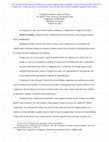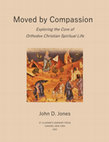Papers by John D . Jones
1. La conception de l'etre chez Thomas d'Aquin. Son interpretation de Pseudo-Dionysius, e... more 1. La conception de l'etre chez Thomas d'Aquin. Son interpretation de Pseudo-Dionysius, et celle de la tradition en general, essentialiste et ontique. 2. Inexactitude de cette interpretation: l'etre est pour P.-D. une cause, mais n'est pas un etat. 3. Etude critique de l'interpretation existentialiste de T. d'Aquin (Gilson, Carlo, Phelan), en fait fondamentalement essentialiste. Identite fondamentale des deux philosophes, par-dela cette interpretation| une fois libere du cadre essentialiste de son langage, T. d'A. se rapproche de la conception non-ontique de l'etre de P.-D.
Marquette University Press eBooks, 1980
... Dionysius, however, briefly presents his Trinitarian theology and Christology in The Divine N... more ... Dionysius, however, briefly presents his Trinitarian theology and Christology in The Divine Names 2. He gives a condensed version of his ... (Pseudo) Dionysius the Areopagite 53 Celestial Hierarchy and the Ecclesiastical Hierarchy, it seems more likely that they should be read in ...
Philosophy in the Contemporary World, 1994
Philosophy and Theology, 2001
The Thomist: A Speculative Quarterly Review, 2005
The Thomist: A Speculative Quarterly Review, 2002
RE YOU SURE you really need that?" We are all familiar with this sort of question. In allocating ... more RE YOU SURE you really need that?" We are all familiar with this sort of question. In allocating resources in our personal nd social lives, we often assign a key role to distinguishing what people need from what they do not need or perhaps merely desire. David Macarov, for example, claims that a basic function of social welfare programs is to distinguish needs from desires. 1 Discourse about needs ("needs discourse") also plays a key role in various psycho-social theories of development and well-being. 2 But needs discourse is not merely practical in nature; it raises a host of complex theoretical problems related to defining needs, distinguishing basic needs from other needs, determining the relation between culture and needs, and so forth. 3

Logos: A Journal of Eastern Christian Studies, 2012
This article is the latest in a series of papers in which the author has explored how the Divine... more This article is the latest in a series of papers in which the author has explored how the Divine Names and Mystical Theology of Dionysius the Areopagite have been read in terms of three 'frameworks': Neoplatonic, Greek patristic/ Orthodox Christian, and Medieval Latin scholastic. In this article, the author focuses on Dionsyius's reference to the Transfiguration of the Lord (DN 1.4, 592B-C) and the sort of embodied knowledge we can have of God in theophanic experiences. This text provides a very good example for contrasting the Latin scholastic and Orthodox/Greek patristic interpretations of Dionysius. It also provides an excellent example of a text that cannot be accommodated within a strictly Neoplatonic interpretation of the Divine Names. The author spends most of the article examining the quite different frameworks in which St. Gregory Palamas, on the one hand, and Sts. Albert the Great and Thomas Aquinas, on the other hand, interpret this text. In the end the author shows that these different frameworks for interpreting Dionysius's reference to the Transfiguration rest on quite different epistemologies.
Philosophy and Theology, 2001
This article provides critical analysis of Aquinas's designation of poverty as unqualifiedly evil... more This article provides critical analysis of Aquinas's designation of poverty as unqualifiedly evil. This paper provides an analysis of two different meanings of poverty: (a) in relation to things or to the external conditions in which people live and (b) in relation to an action in which people engage or are thwarted. Next, the paper discusses the sense in which poverty is an evil-and particularly, an unqualified evil-in relation to both of these meanings of poverty. Since Aquinas claims that poverty is an unqualified evil so far as it prevents people from attaining the ends of sustaining themselves and assisting others, the final section of the paper discusses possible interpretations of these ends, suggesting that each end can be taken in a narrow, minimalist or subsistence sense and a broader, more holistic or contextualized sense.

Philosophy and Theology, 2006
Would you see His altar also?…This altar is composed of the very members of Christ, and the body ... more Would you see His altar also?…This altar is composed of the very members of Christ, and the body of the Lord becomes an altar. This altar is more venerable even than the one which we now use. For it is …but a stone by nature; but become holy because it receives Christ's Body: but that altar is holy because it is itself Christ's Body….[which] you may see lying everywhere, in the alleys and in the market places, and you may sacrifice upon it anytime…When then you see a poor believer, believe that you are beholding an altar. When you see this one as a beggar, do not only refrain from insulting him, but actually give him honor, and if you witness someone else insulting him, stop him; prevent it. [2] [Vagrants are the] "vast heap of social refuse-the mere human street sweepings-the great living mixen that is destined, as soon as spring returns, to be strewn far and near over the land, and serve as manure for the future crime crop of the country."[3] The 'problem of poverty' has been, and is today, defined primarily in terms of the moral values of work. Those who fail to support themselves or their families through work…without a socially approved excuse at a socially approved job…are defined as deviant….Moral degradation of the poor is used as a negative symbol to reinforce the work ethic. [4]

Rencontres de Philosophie Médiévale, 2006
Then Moses separates himself from the crowd, and with select priests reaches the height of the di... more Then Moses separates himself from the crowd, and with select priests reaches the height of the divine ascents. Even so, he is not with God, he contemplates not God himself-who is invisible-but the place where God is. I think this signifies that the most divine of what is seen or understood are certain subordinate principles of what is subordinate to him who transcends everything, by means of which his presence, which is above all thinking, is shown walking above the intellectual heights of his holiest places. And then Moses breaks loose from all that is seen and all that sees and enters the darkness of unknowing, the darkness that is truly mystical, in which he shuts off all that is cognitively received and comes to be in that, entirely impalpable and invisible-belonging entirely to him who is above all, and no one/nothing neither himself nor another, united to him who is utterly unknown by the cessation of all knowledge, for the best, knowing beyond mind by knowing nothing 1. So writes Pseudo-Dionysius Areopagite at the end of Mystical Theology 1.3, at least according to the 12 th century translation of John

Studies in Christian Ethics, 2021
For the Life of the World ( FLW), part IV, offers a thought-provoking discussion about the proble... more For the Life of the World ( FLW), part IV, offers a thought-provoking discussion about the problems of poverty, wealth and civil justice. Poverty, basic needs and a living wage are central to the concerns and proposed goals for action in this part. While understandably referred to in a general sense since FLW is ‘a preliminary step for further discussion’, in the contemporary world, these issues are highly ambiguous, controversial and difficult to measure. Hence, to promote further dialogue, I explore and highlight critical issues that must be addressed. I also offer a brief discussion of the stigmatization of poverty that cruelly affects many who are poor. I argue that to develop a more expansive theological and normative discourse about poverty and wealth, we should first aim to clearly understand key terms such as poverty in a fully multidimensional, holistic manner that explicitly considers the dynamics of the stigmatization of poverty.
Journal for Peace and Justice Studies, 1996
Proceedings of the American Catholic Philosophical Association, Jul 1, 1977
Pseudo-Denys pose Dieu comme cause de tous les êtres, mais ne lui reconnaît pas le caractère d&#x... more Pseudo-Denys pose Dieu comme cause de tous les êtres, mais ne lui reconnaît pas le caractère d'être. Dans sa théologie(mystique) négative, il refuse toute tentative pour rendre la divinité compréhensible. Ainsi celle-ci se différencie-t-elle de la métaphysique, puisqu'elle finit ...
Philosophy Research Archives, 1986

American Catholic Philosophical Quarterly, 2008
I draw on earlier research to develop contrasts between interpreting the conception of God in the... more I draw on earlier research to develop contrasts between interpreting the conception of God in the Divine Names in terms of Neoplatonic, Latin Scholastic (specifi cally Albertinian and Th omistic), and Byzantine / Eastern Christian frameworks. Based on these contrasts, I then explore whether Albert the Great and Th omas Aquinas were infl uenced, and possibly led astray, by John Sarracen's translation of key terms and phrases in the Divine Names such as uJ pev r, uJ perouv sio~ and its cognates, o{ ti potev ej stiv n, u{ parxi~, and uJ perousiov th~. I conclude that Sarracen's mistranslation of u{ parxi~ by essentia clearly reinforces an essentialist interpretation of God in the Divine Names-that is, the view that God is an absolutely simple being identical to its essence. It is not clear that his translations of the other terms do the same, although they are most often read in an essentialist fashion by Albert and Aquinas. 3 Aristotle, Metaphysics I.1.981b27 and IV.1.1003a20, respectively. 4 Plotinus, Enneads VI.9.3.1.2. The DIVINE NAMES in John Sarracen's Translation One "in itself," ends up with nothing. Or more precisely, it ends up where it started since, of course, eidetic thinking of the One always makes it many, that is, establishes the One as being or, more accurately, as the totality of beings. Plotinus gives a remarkable expression to this point in Ennead III.8.8: When intellect contemplates the One, it is not as one, otherwise intellect would not come to be. But beginning as one it did not stay as it began, but unawares, became many, as if heavy with drunken sleep, and unrolled itself because it wanted to possess everything. 5 8
Conference Presentations by John D . Jones

The contents of this paper are worked out in more complete detail in chapters 5 and 6 of my new ... more The contents of this paper are worked out in more complete detail in chapters 5 and 6 of my new book: "Moved by Compassion: Exploring the Core of Orthodox Christian Spiritual Life." (St Vladimir's Seminary Press, 2022).
Is compassion at all connected with justice? Yes and no. I’ll give a nod to the ‘no.’ But I want to present an understanding of compassion as a holistic disposition of radical non-judgmental openness to others oriented to acting with and for their sake. I’ll briefly contrast compassion with empathy, sympathy, and especially with pity. I hope to show two things:
1) Compassion provides a powerful ‘existential’ counter to the many individual and collective passions, attitudes and thoughts by which people are often marginalized, oppressed or seen as defective. Compassion, thereby, provides a ‘lived’ reinforcement and validation of a fundamental claim of justice: that all people are to be afforded equal dignity, respect and honor (homotimos).
2) Compassion provides a powerful support and impetus for meeting a fundamental claim of social justice, namely, that social institutions and structures should serve to promote and protect human flourishing in light of the fundamental equality of dignity or honor of humans. Compassion plays a central role in the search for social justice since it serves to challenge and undermine the many invidious distinctions which can illegitimately marginalize people and groups in a social world.
Books by John D . Jones

St. Vladimir's Seminary Press, 2022
The book provides an articulation of the profoundly robust sense of compassion in the Orthodox Ch... more The book provides an articulation of the profoundly robust sense of compassion in the Orthodox Christian tradition, rooted in the Greek Patristic tradition, and to deal with a very practical question: “Why should we care about being compassionate?” This is the first major study of compassion in the Orthodox Christian tradition.
Here is a very brief description of the work:
Why should we care about being compassionate? To provide a response to this very practical question, I explore the meaning, nature, and role of compassion in our spiritual life: everyday life animated by the grace of the Holy Spirit and our love for Christ. I examine the expression of compassion in Orthodox Christian worship, Holy Scripture, and Patristic and other Orthodox Christian writings; I also draw on a number of works outside this tradition to supplement my investigation.
I develop the Orthodox Christian framework in which compassion is situated to show that:
• The compassion of God—the Trinity—and Christ fundamentally shapes their presence to creation. In his Incarnation, Christ radically unites divine and human compassion.
• Rooted in our nature, the capacity for compassion belongs to all people and is developed and perfected, with God’s grace, in our lifelong journey of becoming living icons of Christ.
• Human compassion is not simply an emotion but a fundamental virtuous disposition. Grounded in the heart, the center of our lives, being moved by compassion arises from an alert sensitivity to suffering that bears with and cares for others for their sake. Animated by a thoroughgoing neighborliness, hospitality, and spirit of fellowship towards others, it holistically affirms others in their humanity as unique persons in community with others and never supports denigrating or marginalizing judgments and actions. It is perfected through humility, dispassion, and a radical acceptance of our human condition: its intrinsic honor and its vulnerability.
• Compassion is vital in overcoming many toxic passions and attitudes that poison our hearts and undermine our relationships with others and with God. It is fundamentally different from pity in the modern sense of that term.
• Compassion is vital to our responsibility to face the world and live for others as an integral part of our liturgy after the liturgy.
• Compassion is not simply a matter of “charity” or mercy but is also fundamentally linked with individual and collective efforts to promote justice: personal, social, and institutional. At its core, compassion directs us to an irenic, or peaceful, non-violent resistance to evil.











Uploads
Papers by John D . Jones
Conference Presentations by John D . Jones
Is compassion at all connected with justice? Yes and no. I’ll give a nod to the ‘no.’ But I want to present an understanding of compassion as a holistic disposition of radical non-judgmental openness to others oriented to acting with and for their sake. I’ll briefly contrast compassion with empathy, sympathy, and especially with pity. I hope to show two things:
1) Compassion provides a powerful ‘existential’ counter to the many individual and collective passions, attitudes and thoughts by which people are often marginalized, oppressed or seen as defective. Compassion, thereby, provides a ‘lived’ reinforcement and validation of a fundamental claim of justice: that all people are to be afforded equal dignity, respect and honor (homotimos).
2) Compassion provides a powerful support and impetus for meeting a fundamental claim of social justice, namely, that social institutions and structures should serve to promote and protect human flourishing in light of the fundamental equality of dignity or honor of humans. Compassion plays a central role in the search for social justice since it serves to challenge and undermine the many invidious distinctions which can illegitimately marginalize people and groups in a social world.
Books by John D . Jones
Here is a very brief description of the work:
Why should we care about being compassionate? To provide a response to this very practical question, I explore the meaning, nature, and role of compassion in our spiritual life: everyday life animated by the grace of the Holy Spirit and our love for Christ. I examine the expression of compassion in Orthodox Christian worship, Holy Scripture, and Patristic and other Orthodox Christian writings; I also draw on a number of works outside this tradition to supplement my investigation.
I develop the Orthodox Christian framework in which compassion is situated to show that:
• The compassion of God—the Trinity—and Christ fundamentally shapes their presence to creation. In his Incarnation, Christ radically unites divine and human compassion.
• Rooted in our nature, the capacity for compassion belongs to all people and is developed and perfected, with God’s grace, in our lifelong journey of becoming living icons of Christ.
• Human compassion is not simply an emotion but a fundamental virtuous disposition. Grounded in the heart, the center of our lives, being moved by compassion arises from an alert sensitivity to suffering that bears with and cares for others for their sake. Animated by a thoroughgoing neighborliness, hospitality, and spirit of fellowship towards others, it holistically affirms others in their humanity as unique persons in community with others and never supports denigrating or marginalizing judgments and actions. It is perfected through humility, dispassion, and a radical acceptance of our human condition: its intrinsic honor and its vulnerability.
• Compassion is vital in overcoming many toxic passions and attitudes that poison our hearts and undermine our relationships with others and with God. It is fundamentally different from pity in the modern sense of that term.
• Compassion is vital to our responsibility to face the world and live for others as an integral part of our liturgy after the liturgy.
• Compassion is not simply a matter of “charity” or mercy but is also fundamentally linked with individual and collective efforts to promote justice: personal, social, and institutional. At its core, compassion directs us to an irenic, or peaceful, non-violent resistance to evil.
Is compassion at all connected with justice? Yes and no. I’ll give a nod to the ‘no.’ But I want to present an understanding of compassion as a holistic disposition of radical non-judgmental openness to others oriented to acting with and for their sake. I’ll briefly contrast compassion with empathy, sympathy, and especially with pity. I hope to show two things:
1) Compassion provides a powerful ‘existential’ counter to the many individual and collective passions, attitudes and thoughts by which people are often marginalized, oppressed or seen as defective. Compassion, thereby, provides a ‘lived’ reinforcement and validation of a fundamental claim of justice: that all people are to be afforded equal dignity, respect and honor (homotimos).
2) Compassion provides a powerful support and impetus for meeting a fundamental claim of social justice, namely, that social institutions and structures should serve to promote and protect human flourishing in light of the fundamental equality of dignity or honor of humans. Compassion plays a central role in the search for social justice since it serves to challenge and undermine the many invidious distinctions which can illegitimately marginalize people and groups in a social world.
Here is a very brief description of the work:
Why should we care about being compassionate? To provide a response to this very practical question, I explore the meaning, nature, and role of compassion in our spiritual life: everyday life animated by the grace of the Holy Spirit and our love for Christ. I examine the expression of compassion in Orthodox Christian worship, Holy Scripture, and Patristic and other Orthodox Christian writings; I also draw on a number of works outside this tradition to supplement my investigation.
I develop the Orthodox Christian framework in which compassion is situated to show that:
• The compassion of God—the Trinity—and Christ fundamentally shapes their presence to creation. In his Incarnation, Christ radically unites divine and human compassion.
• Rooted in our nature, the capacity for compassion belongs to all people and is developed and perfected, with God’s grace, in our lifelong journey of becoming living icons of Christ.
• Human compassion is not simply an emotion but a fundamental virtuous disposition. Grounded in the heart, the center of our lives, being moved by compassion arises from an alert sensitivity to suffering that bears with and cares for others for their sake. Animated by a thoroughgoing neighborliness, hospitality, and spirit of fellowship towards others, it holistically affirms others in their humanity as unique persons in community with others and never supports denigrating or marginalizing judgments and actions. It is perfected through humility, dispassion, and a radical acceptance of our human condition: its intrinsic honor and its vulnerability.
• Compassion is vital in overcoming many toxic passions and attitudes that poison our hearts and undermine our relationships with others and with God. It is fundamentally different from pity in the modern sense of that term.
• Compassion is vital to our responsibility to face the world and live for others as an integral part of our liturgy after the liturgy.
• Compassion is not simply a matter of “charity” or mercy but is also fundamentally linked with individual and collective efforts to promote justice: personal, social, and institutional. At its core, compassion directs us to an irenic, or peaceful, non-violent resistance to evil.